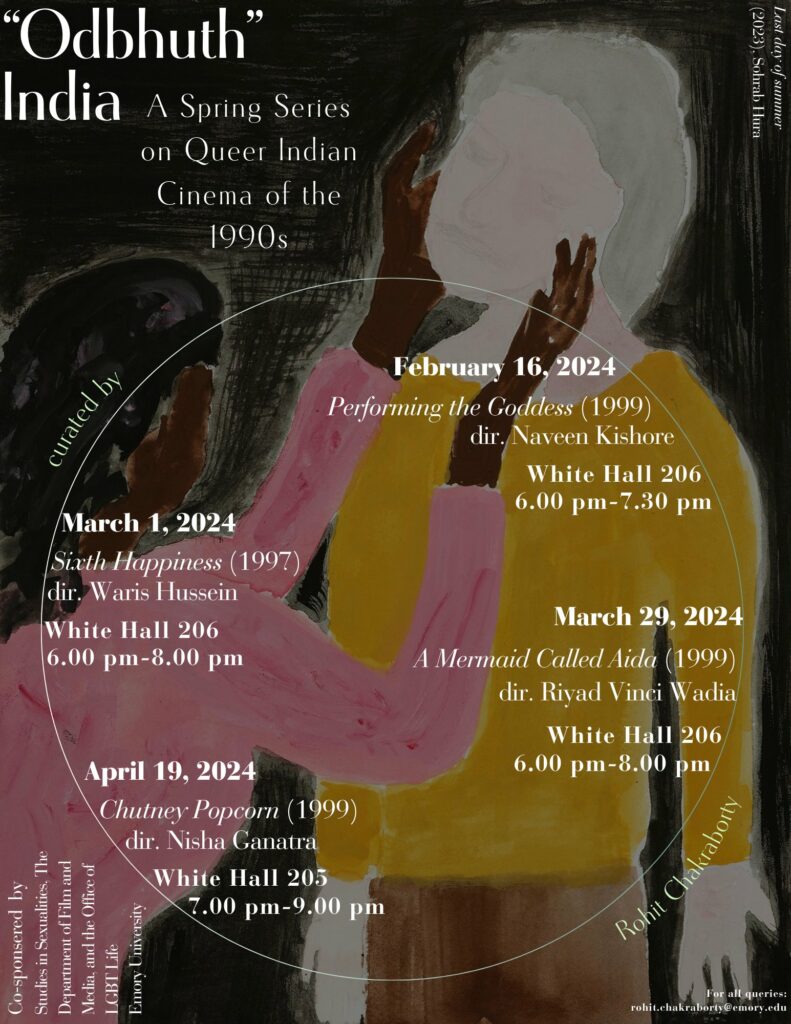
(Courtesy of Rohit Chakraborty)
In an effort to uncover queer voices from South Asian cultures within the Emory University community, Rohit Chakraborty (22G, 25G) curated the “Odbhuth India” cinema series with South Asian Studies Librarian Gautham Reddy. The cinema series, which is free to the public, includes four movies in the Indian queer film canon.
The movies include “Performing the Goddess: The Chapal Bhaduri Story” (1999), “Sixth Happiness” (1997), “A Mermaid Called Aida” (1996) and “Chutney Popcorn” (1999). The series screened the first of these films in Goodrich C. White Hall on Feb. 16.
Explaining how they named the series, Chakraborty said “Odbhuth” means “queer” in Bengali. They are also teaching “Fictions of Human Desire” in the English department. The course parallels the cinema series, covering topics similar to what the movies convey.
Chakraborty said they began curating the movie selection in 2021 after they won the 2019-2020 Studies in Sexualities essay prize and met Reddy at the prize ceremony in 2021.
While the two hit it off at the event, Chakraborty said that the curating process was less smooth. The public screening fee for these old movies was exorbitant due to the required restoration process .
Additionally, Chakraborty said they found it challenging to contact the movies’ rights holders.
“It became very difficult for me to reach out to rights holders, because they wouldn’t talk to a grad student,” Chakraborty said.
Fortunately, Chakraborty and Reddy read the “Trikone Flyers and membership materials, undated” archive, which documents voices from South Asian LGBTQ+ communities. Connecting with queer people mentioned in this archive, Chakraborty found access to movies they wanted to bring to Emory. Specifically, they found ’90s Indian queer cinema, which Chakraborty said was the decade in which Indonesian nationalists began to strongly resist queerness.
“My ambition [was not] to canonize them,” Chakraborty said. “It was not to induce any kind of remedy. It was mostly to create a showcase for them.”
Before the first screening, Chakraborty described this curation process and highlighted queer voices within Bengali folk culture to the audience.
“Performing the Goddess: The Chapal Bhaduri Story” is a documentary on Jatra performance directed by Naveen Kishore. Jatra originates from Bengali folk culture, where male actors dress as female characters, read and sing about religious stories.
Chakraborty also displayed a QR code for a feedback form to the audience, encouraging direct artistic conversation between the audience and the filmmaker.
The documentary started with relatively light-hearted scenes, where the Jatra actor showcased his performance skills. Audience members laughed gently with the movie. However, sorrow enveloped the room when the film described the actor’s homosexual relationship that made the Jatra actor Chapal Bhaduri so joyful yet so confused. When the actor tried to deconstruct the heteronormative social norms to understand his sexuality, the audience fell quiet. The documentary ended on the line, “There is nothing wrong with it. This is art,” which the audience followed with a sustained round of applause.
Instead of hastily leaving the theater after the screening, numerous audience members filled out the feedback forms while lingering in conversations about the movie.
“It was incredible,” Akshaya Natarajan (22B, 25L) said. “For being at a reasonably good university, I don’t think that we get enough exposure to the arts, especially the arts that are not mainstream.”
Natarajan was one of the only Emory students to attend the screening. Most who came to the event were nearby residents.
“There’s a lot of talk about us being an international campus,” Natarajan said. “In terms of the amount of exposure that international events get, it’s quite surprising how not plugged-in Emory students are to that.”
Reddy also commented on the importance of centering voices in underrepresented cultures through such screenings.
“Focusing on queer voices from the diaspora was one way of really developing that diversity in our collections and ensuring that there’s something very unique and special about our collection as well,” Reddy said.
The other films in the “Odbhuth India” series will screen in Goodrich C. White Hall on March 1, March 29 and April 19. Chakraborty said they hope these curated movies will continue to bring to life queer voices from South Asia for audiences on Emory’s campus.





